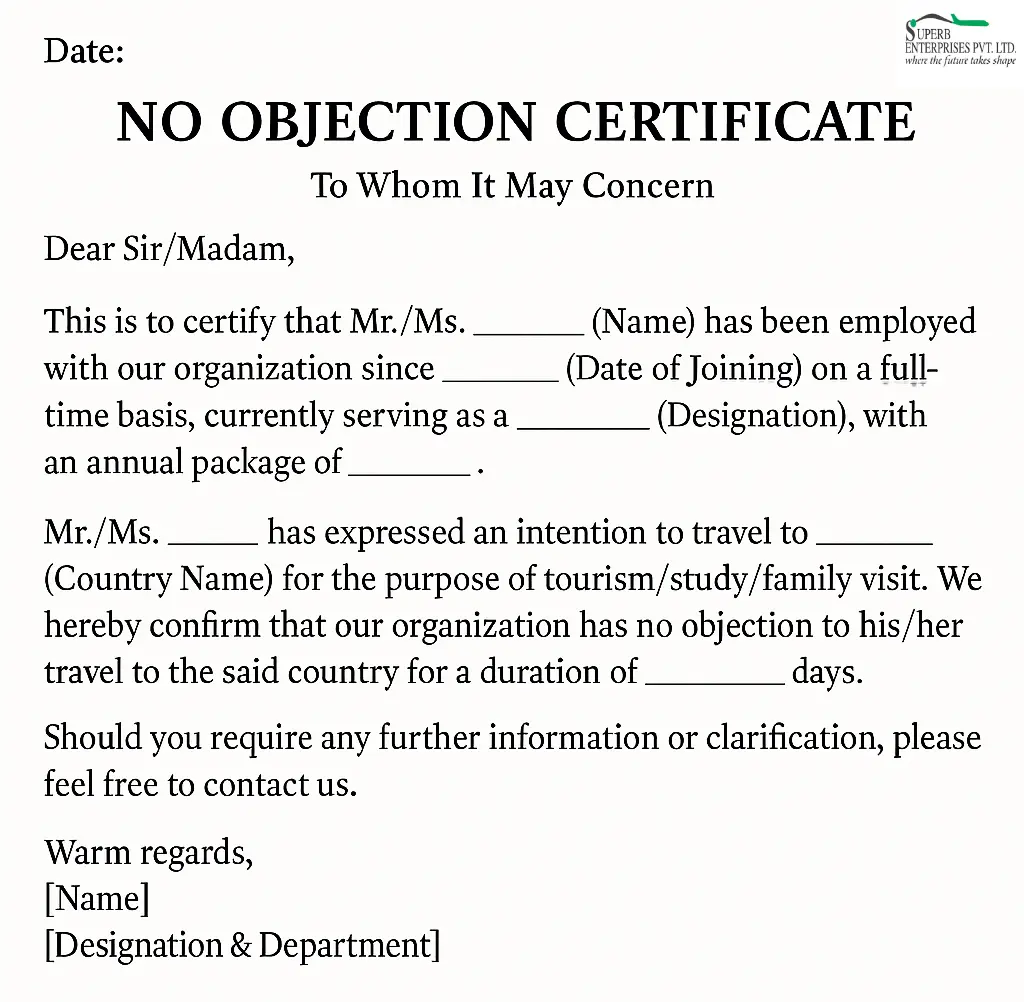The No Objection Certificate (NOC) functions as a fundamental legal declaration in which organisations, institutions and individuals confirm their consent regarding whatever particular requests or activities may be under consideration. NOC are imperative across various fields like employment, immigration procedures, property transfers, international travel, etc.
In this blog, we will talk about the NOC Certificate, starting from the meaning and importance of the No Objection Certificate to various types and the necessary documents needed to obtain a NOC. We will discuss the application process and provide templates of the NOC. Read this blog for a complete understanding of the NOC!
What is a No Objection Certificate?
An NOC certificate, also known as a No Objection Certificate, is an official document issued by an individual, organisation, or governmental agency declaring no objection regarding the details specified in the certificate
The document functions as official authorisation, which prevents legal and administrative barriers from appearing throughout the process. The NOC functions as official confirmation that shows authorities have approved the requested transition, irrespective of whether it is regarding a job change, a visa application, selling property or relocating a vehicle.
Why is a NOC Certificate Required?
The NOC certificate stands as a necessary legal instrument which prevents conflicts and enables smooth transactions. The following reasons establish why a NOC is essential:
- Employment – Employers routinely supply NOC to departing employees, especially those working in government jobs and contractual roles. It is often used to validate the financial obligations and to convey that there are no legal issues. Employees need a NOC, particularly when starting employment at a new organisation.
- Higher Education Abroad – The application process for overseas university admission sometimes requires students to secure a NOC from their current educational institution, which demonstrates they have no outstanding obligations and are free to pursue education elsewhere.
- Property Sale or Rent – Real estate transactions require a NOC from the housing society or the previous owner to confirm that the property transfer does not face any pending legal troubles or any pending payments, or objections.
- Immigration & Visa Processing – To apply for work permits, student visas or residency, many nations need a NOC from the applicant, obtained either from an employer or educational institution.
- Banking and Loans – NOC is required for the majority of financial transactions, and also proves useful in loans and other similar transactions.
- Legal & Business Agreements – An NOC is needed to obtain agreement from all involved parties for terms related to partnerships, mergers and contract terminations.
- Vehicle Transfer – Obtaining an NOC from the Regional Transport Office (RTO) becomes necessary when someone transfers or sells their vehicle to another state to validate that there are no pending fines or legal troubles.
Types of No Objection Certificate
Different types of NOC ( no objection certificate ) come into use in different scenarios. Here are some of the most common and widely used types of NOC certificates;
- Employment NOC – Issued by an employer when an employee resigns or takes up a new job. It ensures that there are no pending dues or contractual violations. Employment NOC is needed if the candidate wishes to leave the job and take up further studies, or if they want to work in a different organisation.
- Student NOC – It is generally needed for students moving abroad to pursue higher education. A student NOC is issued by the current school/college, confirming no outstanding fees or disciplinary issues.
- Vehicle NOC – This type of NOC is compulsorily required for interstate vehicle transfers or resale. A vehicle NOC is issued by the RTO after ensuring there are no pending fines or legal issues.
- Visa NOC – Not all countries require a Visa NOC, but some countries do. It is useful in ensuring that the applicant has no obligations in the home country that can prevent them from travelling if the visa is issued. Visa NOC are most commonly needed for student or employment visas.
- Bank NOC – It is provided by the issuing bank after closing a loan or settling dues. Not only can it serve as evidence in the court of law if needed, but it is also useful for collecting all the legal documents related to the ownership of a property, car or any such article for which you had initially taken out a loan. A bank NOC will also be required for transferring bank accounts.
- Property NOC – Before property transfer or sale takes place, local authorities, together with banks/lending institutions, must provide a NOC. The issued NOC confirms that the property presents no legal problems to buyers.
Each NOC category is different, serving unique and very specific purposes to ensure smooth and lawful functioning.
Documents Required for NOC ( No Objection Certificate )
The exact documents required to secure a NOC will depend on the type of NOC and the issuing authority. Nonetheless, here are some common documents that may be required;
- Identity Proof (Aadhaar, PAN, Passport, Voter ID)
- Address Proof (Utility Bills, Rental Agreement)
- Application Form (Issued by the concerned authority)
- Resignation letter
- Experience Certificate
- Admission letter
- Bonafide Certificate
- Sale Deed
- Ownership Papers
- Tax Receipts
- Loan Closure Proof
- Account Statements
- Job Offer Letter
- University Admission Letter
How to Get a NOC Certificate?
As you already know, a no-objection certificate is an essential document for Employment, Higher Education Abroad, Immigration & Visa Processing, Legal & Business and more. if you want to know how to get a NOC Certificate, then here are the full details regarding this
Step 1 – Identify the Issuing Authority
The initial step is to identify the issuing authority, depending on the type of NOC being applied. The employer for employment-related NOC, the Bank for loan-related NOC, the College/University for student NOC and so on.
Step 2 – Submit a Formal Application
The next step is to write an application requesting the issuing authority to release the NOC. Candidates are also required to submit the supporting documents along with the written application. Some authorities provide online application options so a written application may not be necessary in that case.
Step 3 – Verification Process
Once the applications are submitted, the issuing authority checks for pending dues or other related legal issues. For property NOC, an extensive background check may be conducted. It is a standard practice to ensure compliance before processing the application.
Step 4 – Approval & Issuance
Upon successful completion of the verification process, the NOC is issued on the official letterhead of the issuing authority. In some cases, the issued NOC may require notarisation or attestation for legal validity and international acceptance.
Step 5 – Attestation (For International Use)
Finally, if the NOC is to be used abroad for reasons such as higher education, employment and so on, it will need to be attested by the concerned authorities in the home country and the embassy of the destination country.
No Objection Certificate Format
There is no fixed format of a NOC, however, a standard NOC includes the following details:
- Header – Name & Address of Issuing Authority
- Date of Issue –
- Subject – “No Objection Certificate”
- Body:
Name & details of the applicant
Purpose of the NOC
Declaration of no objection
Validity Period (If applicable)
Authorised Signatory (Name, Designation, Seal)
NOC Certificate Sample
Here is the format of a no-objection certificate

Why NOC Attestation is Important for International Use
The majority of nations need an attested NOC for many reasons, including approval of visas, work permits and so on. Here are some reasons why NOC attestation is so important;
- Legal Recognition – Many countries require the candidates to submit an attested NOC in compliance with the local laws. Without the attestation stamp, the NOC may not be accepted as legal and authentic.
- Vis Application – Attested NOC, wherever applicable, must be submitted with the visa application to ensure smooth and hassle-free processing.
- Higher Education – Students hoping to secure admission to international universities and colleges should submit an attested NOC as a part of the application procedure.
- Employment – Many employers need international candidates to provide a NOC verified by the concerned authorities before offering a job.
Conclusion
The No Objection Certificate is an essential document for legal, professional, and personal needs. A valid NOC allows important transactions such as job transitions, property sales, vehicle transfers, foreign relocations, and so on to proceed.
Always check the exact requirements to obtain a NOC for your particular purpose and seek proper attestation services when applying it for overseas use. By following the correct procedures, you can obtain a NOC efficiently and without delays.
Frequently Asked Questions
No, it is not always mandatory, but some countries (like the UAE, Canada, USA) require it for work or student visas.
Typically, 3-6 months; however, the validity depends on the issuing authority and the type of NOC.
Yes, it is quite common for NOC to get rejected if there are pending dues, legal disputes, or incorrect documentation.
Yes, a NOC from the local RTO is mandatory, especially for interstate transfers.
Yes, depending on the NOC type, it is possible to apply for it online through the official portals.
Read Our Popular Blog




